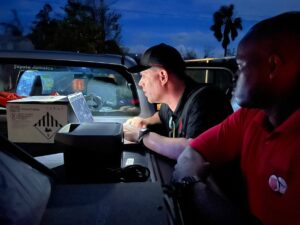 SAN DIEGO ARC graduate Cheryl Marlowe (r) teaches South African tribal peoples computer skills. Here she explains hardware functions by showing students the inner workings of one of the donated computers. |
BY MARLENE GERBER –
When Cheryl Marlowe graduated from the San Diego, Calif., Salvation Army Adult Rehabilitation Center’s (ARC) recovery program, she knew she was destined for a new and better life. But she never dreamed that four years later she would be doing missionary work among the tribal peoples of South Africa.
“It was the most incredible experience of my life” the San Diegan said. She said that their willingness to learn, their close spiritual contact with God and overall genuine kindness moved her deeply. The Zulus gave her the name of Mpho, which translates to Gift from God. “Because of my mission trip to Africa,” she added, “I am a changed person.”
Until she came into the ARC program, Cheryl had no spiritual or religious life to speak of. She had fled the Philadelphia ghetto where she was raised by a poor, single, alcoholic father, and joined the Navy. College training during this time subsequently led to very good jobs in the aerospace industry. But all the time she was striving for a better professional life, her personal life was profoundly disappointing. She still felt like the shy, lonely teenager that she had been when she began doing drugs, trying to dull the pain. The “hole in her soul” grew deeper, as addiction took its terrible toll. Since substance abuse is no respecter of race, class, education or other distinctions, Cheryl ended up homeless, penniless, friendless and literally on the streets.
She tried several rehab programs and recovery homes, without success. Finally in desperation the day after Christmas in 1996, Cheryl stood on a street corner and “raised my voice to God and surrendered to his will.” She entered the San Diego ARC shortly thereafter. She experienced a profound spiritual awakening that led, for the first time, to a solemn commitment to sobriety.
“It was as if all the pieces of the puzzle that made up my life finally fit together when I got here. The program best simulated real life–work, meditation, prayer meetings, therapy–balance,” Cheryl explained. The Salvation Army’s strong emphasis on spiritual growth, she feels, is what made the difference.
“Cheryl flourished here,” Dr. Edward Lataille, director of rehabilitation, said. “She took the program seriously, totally turning her life around. The miracle of recovery was to inspire her to use her talents to make a difference in the lives of others.”
Strengthened by her faith, she was determined to return to productive living. But this time she wanted it to be more meaningful. After re-training in computer science she began a successful career at one of San Diego’s top law firms. At the same time, Cheryl became active in both her church and Alcoholics Anonymous, feeling strongly about service and “giving back.”
An opportunity to combine her technical skills with the social activism of her Christian faith arose, and Cheryl was soon in Cape Town and Johannesburg teaching Zulu and Xhosa Christians computer skills. An attorney at the law firm where she works as a senior computer technician asked for her help on a missionary project, sponsored by the church they both attend. She organized the fundraising, donation and shipping of 35 used computers (courtesy of the law firm) to congregations in South Africa–thus opening the post-Apartheid world to formerly isolated tribal peoples. Now the world is literally at their fingertips. She says it continues to be a most liberating experience for them, and rewarding for her.
The opportunity for missionary work in South Africa last October was a joy. It enabled her to “walk the walk” of Christian service. She wants to return to offer her skills and education to the people there. The next stint, in March, would have her working directly with the tribal children. She looks forward to hearing those beautiful voices singing their prayers, the touching rituals of hospitality, and the graciousness of the African congregation.











